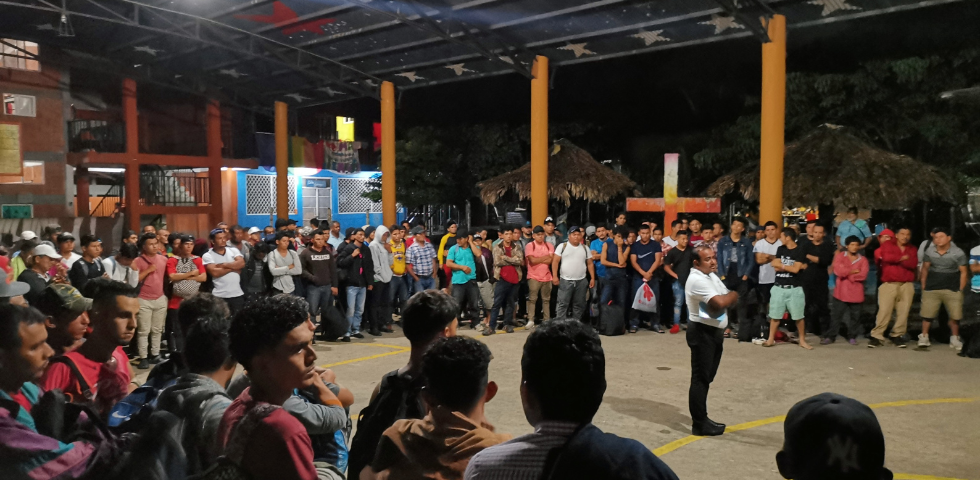World Refugee Day is an international day designated by the United Nations to honor refugees and displaced people around the world. It is commemorated on June 20th of each year.
This is a date to unite in sensitivity and solidarity as members of our “common house.” In this paper we present some data on this dramatic situation, and its demands from the law and from Christian practice.
Who is a refugee, what is their reality in their migratory flow?
“Refugees are people fleeing conflict and persecution. Their status and protection are defined by international law, and they must not be expelled or returned to situations where their lives and freedoms are at risk” (UN 2021).
As already defined, when a persone leaves their home, territory and heritage for the reasons listed above, they become a refugee, a “foreigner” in a new land. In 2018, at least 70.8 million people had to leave their homes due to conflicts, and of these, at least 15 million are minors.
At the end of 2019, there were 79.5 million forcibly displaced people in the world, from 76 countries. The largest refugee receiving countries at the end of 2019 were: Turkey with 3.6 million people, Colombia 1.8 million; Pakistan 1.4 million; Uganda 1.4 million; Germany 1.1 million. “There are an estimated 10 million stateless people who have been denied a nationality and access to basic rights such as education, health, employment and freedom of movement.”[1]
The UNHCR, speaking in figures says, “a growing number of people in Central America are being forced to leave their homes. Worldwide, the figure is close to 597,000 refugees and asylum seekers from El Salvador, Guatemala and Honduras. The political instability that has prevailed in Nicaragua since April 2018 has pushed out around 200,000 people; more than 130,000 asylum applications were submitted in Mexico (government figures, 2021)”[2]
In Panama, according to information from the Norwegian Council for Refugees, there are 2,300 people with refugee status and around 15,000 in need of international protection. These migrants, in the legal process to obtain refuge, encounter many bureaucratic complications on the part of the Panamanian state. This makes it urgent to improve and facilitate the procedure, as well as government policies and budget to better support this human drama.
In the territories of Latin America, the situations that cause people to be refugees include: violence against the population (usually by organized crime and armed groups, that is, gangs and drug traffickers), territorial dispossession by extractivist projects, and persecution, criminalization and murder of human rights defenders in the communities.
According to international agreements, what does it mean to seek protection?
The right to seek asylum: Seeking asylum is a human right. Anyone who is fleeing persecution, conflict or human rights violations has the right to request protection in another country.
The right to safe access: borders must remain open to all people who have been forced to flee. Restricting access or closing borders can make the journey of those seeking protection even more dangerous.
The right to non-refoulement: No person should be forced to return to a country where their life or freedom is in danger.
The right to no discrimination: People must not be discriminated against at borders. All applications for refugee status must receive fair consideration.
The right to humane treatment: People who have been forced to flee deserve to be treated with dignity and respect. They have the right to be treated with dignity, like any other human being. This translates into keeping families together, protecting people from human trafficking and preventing arbitrary arrests.”[3]
The protection of the one who seeks refuge in Christian spirituality
In the spirituality of the People of Israel, the people who considered them needy and abandoned, considered them protected from “The liberating God”, these groups were: orphans, widows and foreigners (migrant) (Dt 10, 17-19; 26 ,6-9; Lev 19,33-34; 25,33).
Caring for and defending these people is considered part of the ethical and human rights principles of the people of Israel. Complying with these principles helped peaceful coexistence and “social friendship” between peoples. In addition, these guidelines were sacred, that is, they constituted part of the “commandments” of God’s law for the people, because it is God himself who “loves the migrant, who gives bread and food. Love the migrant because you were a migrant in the land of Egypt.” Dt 10,18-19.
Jesus, the foundation of our Christian faith, presents us with the treatment we must have with the most defenseless or fallen along the way, who needs solidarity and mercy (Lk 10). On the other hand, our Christian spirituality has as content of faith, solidarity, defense and care of the migrant, because, what we do to the “foreigner, migrant or refugee” we do or do not do to the Lord Jesus himself (Mt 25 ,43).
Christian practice arises from sensitivity, from a heart that is compassionate, merciful and thirsty for justice like that of Jesus (Mt 5:1-12). All the practice of Jesus shows that his words and gestures sought to put human life at the center of faith, the care and defense of the most needy who are often ignored or marginalized in the same community of faith (Mk 3,1- 6).


